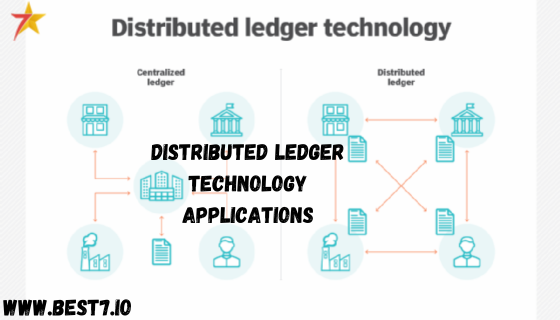
Distributed Ledger Technology (DLT), with its possibilities of reforming many sectors, has been in the limelight for the past few years. Through the decentralized and secure recording of transactions and managing data, sectors such as finance, healthcare, supply chain, and energy have adopted DLT. This technology has reduced fraud, tampering, and payment processing fees, making it a powerhouse for an endless number of applications that revolutionize how businesses operate.
What is Distributed Ledger Technology?
The notion of distributed ledger technology includes systems that enable multiple parties to update and access a common database efficiently. While conventional centralized databases can be modified and tampered with, DLT uses cryptographic methods to secure data and prevent alterations. This growing recognition of its benefits is reflected in the prediction that 40% of companies worldwide will use DLT by 2025, according to a Deloitte report.
DLT in Finance: Transforming Transactions and Security
One of the most popular uses of DLT is in finance, where it is employed to make payments and transactions faster. Traditional banking systems involve intermediaries that slow down processes and increase costs. With DLT, transaction times and costs have been reduced by up to 50%.
Besides payments, DLT in banking has enhanced security and fraud prevention. Recording transactions on a decentralized ledger has given banks better operational insights, enabling real-time monitoring and risk management. According to the World Economic Forum, implementing DLT could cut financial fraud by 40%, fostering trust in financial systems.
Revolutionizing Healthcare with DLT
DLT has proven invaluable in healthcare, especially in managing patient records and sensitive health data. By securely storing and recording patient information, DLT ensures that only authorized individuals can access these records. For example, the Medicalchain platform allows patients to manage their medical records using blockchain. The global healthcare blockchain market size was expected to reach $3.5 billion in 2023, highlighting the growing adoption of DLT in this sector.
Transforming Supply Chain Management
Distributed ledger technology has revolutionized supply chain management by enabling better tracking and authentication of products throughout their lifecycle. Companies can now trace goods quickly, as seen in Walmart’s use of blockchain to identify food contamination in seconds instead of days. This transparency has also been beneficial in industries under ethical scrutiny, such as the diamond trade, where Everledger’s blockchain solution records the origin of diamonds to combat conflict diamond trading.
Energy Sector Innovations with DLT
DLT has been deployed in the energy sector to structure decentralized energy markets, enabling peer-to-peer energy trading. Platforms like Power Ledger allow individuals to trade renewable energy, such as solar power, promoting green energy usage. According to the International Renewable Energy Agency, implementing DLT in energy could reduce costs by as much as 30% by 2030.
Streamlining Logistics and Transportation
The logistics and transportation sectors benefit from DLT’s ability to provide greater control and visibility over shipments. For example, Maersk’s partnership with IBM to develop TradeLens, a blockchain-based platform, has improved real-time container tracking. In 2022, TradeLens processed over 30 million shipping events, showcasing the technology’s potential to enhance logistics operations.
Smart Contracts: Automating Agreements
Smart contracts, powered by DLT, enable automatic and self-executing agreements once specific conditions are met. These contracts have transformed industries like finance, real estate, and law by streamlining processes and eliminating intermediaries. In real estate, for instance, smart contracts can simplify property ownership transfers, accelerating the buying process.
Enhancing Asset Management with DLT
DLT offers advancements in asset management by securely tracking ownership and recording movements between parties. This has significant applications in industries like real estate, art, and intellectual property. Deloitte estimates that DLT could save financial services companies $12 billion annually through improved asset administration and fraud reduction.
Strengthening Compliance with DLT
DLT has become a critical tool for improving compliance efforts in industries with stringent regulations. The transparency and immutable nature of blockchain records help companies demonstrate compliance with anti-money laundering (AML) and know-your-customer (KYC) laws. Financial institutions use DLT to provide real-time transaction tracking and reporting, ensuring regulatory adherence.
DLT in Clinical Trials and Research
In healthcare, DLT has streamlined clinical trial management by enhancing data integrity and traceability. By enabling secure data sharing among researchers, DLT accelerates processes and reduces costs. A study published in the Journal of Medical Internet Research suggests blockchain could cut clinical trial costs by 30%, demonstrating its transformative potential.
The Need for Standardization and Interoperability
As DLT applications grow, the need for standardization and interoperability among various ecosystems becomes crucial. Industry consortia and standards organizations are working to define protocols that ensure seamless collaboration among stakeholders, paving the way for widespread DLT adoption.
Prioritizing Security and Privacy
The future of DLT depends on addressing evolving cyber threats. Enhanced security measures and consensus mechanisms will be essential to protect data and verify its validity. With cybercrime costs projected to reach $10.5 trillion annually by 2025, strengthening DLT’s security frameworks is imperative.
Integrating DLT with AI and Machine Learning
DLT’s integration with AI and machine learning opens doors to advanced analytics and decision-making. By securing training data, DLT prevents corruption and ensures reliable AI outputs. This combination holds promise for industries like finance, healthcare, and supply chain management.
A Revolutionary Future with DLT
DLT is transforming industries by enabling transparency, security, and efficiency. As technology evolves, forward-thinking organizations will continue adopting DLT solutions, reshaping the way businesses operate and driving us toward a more secure and efficient future.












